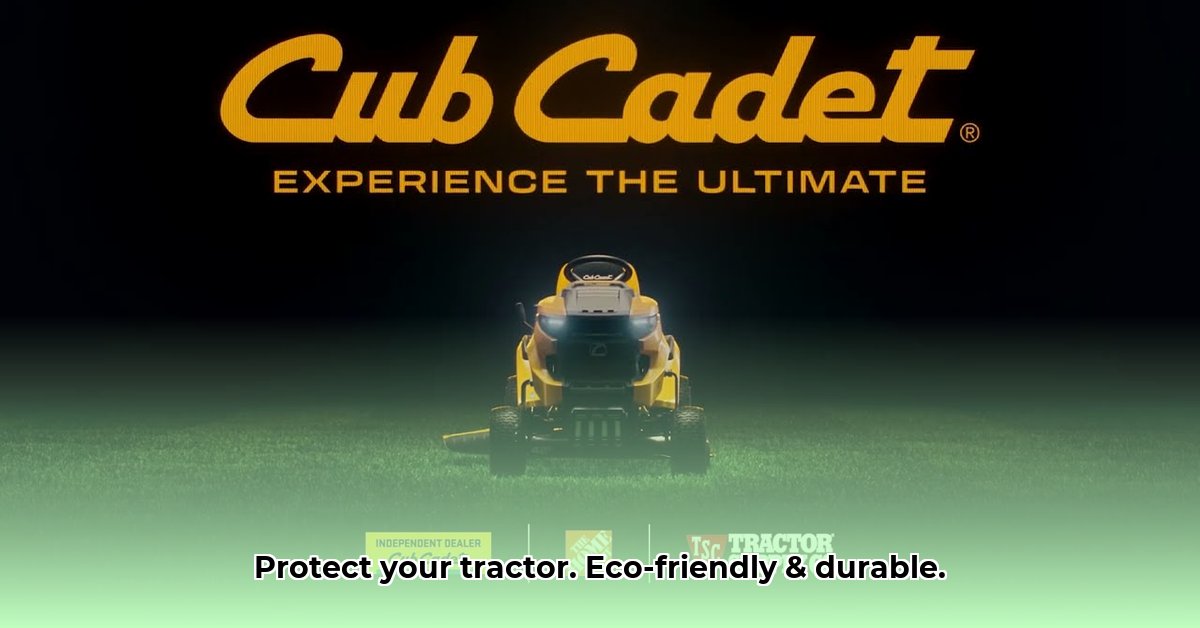
Choosing the Right Tractor Cover for Sustainability and Longevity
Protecting your tractor from the elements is crucial for maintaining its operational efficiency and extending its lifespan. But the choice of tractor cover also presents an opportunity to contribute to sustainable farming practices. This article explores the environmental impact of various tractor covers, focusing on the long-term benefits of investing in durable, eco-friendly options. We'll compare different brands, such as Cub Cadet covers available at Tractor Supply, and highlight the importance of transparency from manufacturers regarding material sourcing and end-of-life disposal. Ultimately, we aim to empower farmers to make informed decisions that benefit both their bottom line and the environment. For example, see this Cub Cadet Tractor for an idea of what to look for in a durable machine.
The Environmental Footprint of Tractor Covers: A Deeper Look
How long should a tractor cover last? Ideally, several years. Frequent replacements generate significant waste, impacting landfills and increasing your environmental impact. While brands like Cub Cadet and Classic Accessories offer durable options, a critical factor is the lack of transparency surrounding their production and materials. Many manufacturers don't fully disclose the materials used or their recyclability, hindering our ability to make truly informed, environmentally conscious choices. Wouldn't more detailed Life Cycle Assessments (LCAs) – comprehensive analyses of a product's entire life cycle – be beneficial? Such transparency would allow for fair comparisons across brands and empower consumer choice.
Did you know that the average lifespan of a low-quality tractor cover is only 1-2 years, whereas a high-quality cover can last 5-7 years or more? This difference significantly impacts waste generation.
Cub Cadet vs. Classic Accessories: A Comparative Analysis
Both Cub Cadet and Classic Accessories offer covers with weather resistance, UV protection, and mildew resistance. However, the absence of comprehensive information on manufacturing processes and materials makes a direct environmental comparison challenging. This lack of transparency is a significant hurdle for environmentally conscious consumers. Dr. Anya Sharma, Environmental Scientist at the University of California, Berkeley, emphasizes, "The lack of readily available Life Cycle Assessments for many agricultural products, including tractor covers, prevents consumers from fully understanding the environmental trade-offs associated with their purchases."
Transparency and Sustainability: A Call for Action
The need for greater transparency from manufacturers is paramount. Full disclosure of materials, manufacturing processes, and end-of-life recycling options is essential for informed consumer choice. Imagine a future where tractor covers are manufactured using recycled materials, minimizing waste and reducing the carbon footprint. This represents a significant opportunity for environmental improvement.
A staggering amount of agricultural equipment-related waste ends up in landfills each year. How much of this could be reduced through better manufacturing practices and consumer choices?
Actionable Steps for Sustainable Farming
Farmers can play a crucial role in promoting sustainable practices. By demanding transparency and supporting eco-conscious brands, we can collectively drive positive change. Here's a practical guide:
- Invest in Durability: Opt for high-quality covers to extend their lifespan. The initial cost might be higher, but the long-term savings outweigh the upfront investment.
- Demand Transparency: Contact manufacturers and request detailed information about their products' environmental impact. Let them know you prioritize sustainable products.
- Support Eco-Friendly Brands: Choose companies committed to eco-friendly materials and manufacturing processes. Purchasing decisions can influence market trends.
- Responsible Disposal: When your cover reaches its end-of-life, explore recycling options. If recycling isn’t possible, consider repurposing or responsible disposal to minimize environmental harm.
The Future of Sustainable Agriculture: One Cover at a Time
The choice of a tractor cover may seem insignificant, but it illustrates a commitment to sustainable farming. By engaging with manufacturers, choosing durable options made from sustainable materials, and demanding transparent labeling practices, we can reduce the environmental impact of agriculture one small step at a time.
What steps are you taking on your farm to minimize waste and promote ecological sustainability? Sharing best practices within the farming community is vital.